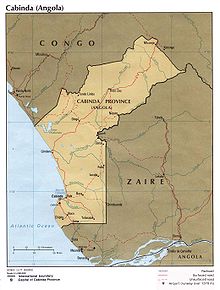Cabinda conflict
The Cabinda conflict is a conflict between the liberation front for Cabinda , Frente para a Libertação do Enclave de Cabinda (FLEC) on the one hand and the Angolan government on the other over secession or state independence of the Cabinda exclave . The roots of the conflict go back to the Portuguese colonial times and the Portuguese colonial war and have their origins in the demand that the overseas province (Portuguese name) Cabinda should become an independent republic. The FLEC initially fought against the Portuguese colonial government from 1963 to 1974/1975; Even before Angola's independence in 1975, Angolan troops occupied the area, which until then had no administrative or other connections to Angola, and the fight was directed against them. Since then, the latent and manifest conflict in the enclave has been one of the longest-running in Africa. A peace agreement was signed in 2006, although the signatories had no demonstrable authority from the FLEC to reach such an agreement. The conflict flared up again in spring 2010 when guerrillas attacked a bus carrying football players from Togo, for which the Cabinda leadership apologized in exile.
background
Cabinda was never seen as part of Portuguese Angola and had no geographical or historical ties to this colony. When Angola gained independence in 1975, Cabinda was not consulted and was simply declared an integral part of Angola "in this context" in the Alvor Convention of January 1975. One of the signatories, the future Prime Minister of Portugal (from autumn 1975) de Azevedo , later declared the document to be a scrap of paper of no value. Cabinda's vast offshore oil resources, which make up 60 percent of Angola's oil reserves, may have contributed to the persistence of the dispute.
The conflict
In 1963 the FLEC joined other liberation movements that fought against the Portuguese colonial power during the Portuguese colonial wars. When these wars ended with the signing of a ceasefire and full independence for all colonies, the FLEC did not take part in the ceasefire negotiations and the independence movement was not recognized by either Portugal or Angola. From November 8 to 11, 1974, Angola had already taken control of the urban areas of the enclave with Cuban help and thus subjected the area to a long guerrilla war. Meanwhile, shortly after the Alvor Accords, Angola itself plunged into civil war , one of the longest in Africa, which changed the MPLA government's priorities for the Cabinda conflict. The FLEC undoubtedly benefited from this, but was faced with even greater problems once the civil war in the motherland ended in 2002. A ceasefire was signed in 2006, but it turned out to be ineffective. Nevertheless, the government of Angola declared the end of the rebellion, although the situation has not fundamentally changed until today. There is an optimistic assessment that the government-in-exile controls 85 percent of the separatist enclave.
The German declaration of intent for the delivery of speedboats to Angola declared in the summer of 2011 is to be seen in connection with the conflict.
Web links
- Cabinda on globalsecurity.org
- UNPO resolution of July 7, 2005
Individual evidence
- ↑ Togo footballers were attacked by mistake, Angolan rebels say , The Guardian, January 11, 2010, accessed August 5, 2011
- ↑ Centro de Documentação 25 de April: Acordo de Alvor
- ↑ Uma Mortalha, por Berço , macua.org
- ↑ Cabinda: Oil - Block Buster , The Washington Post , Special advertising site
- ↑ http://www.cabinda.net/
- ↑ Q&A: Cabinda conflict , BBC News of January 12, 2010, accessed August 5, 2011
- ↑ Federal Government in and for Cabinda ... Never the less we do control more than 85% of the total Territory of our Country.
- ↑ Angela Merkel in the field service: German arms deals in Africa , Friday July 14, 2011, accessed August 5, 2011
- ↑ Angola: Ongoing civil war in Cabinda , kath.net from July 14, 2011, accessed August 7, 2011

